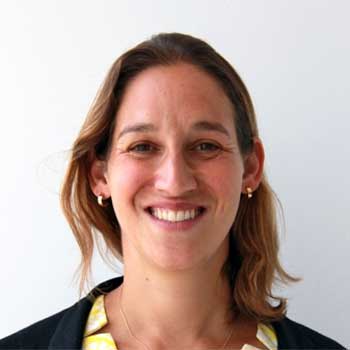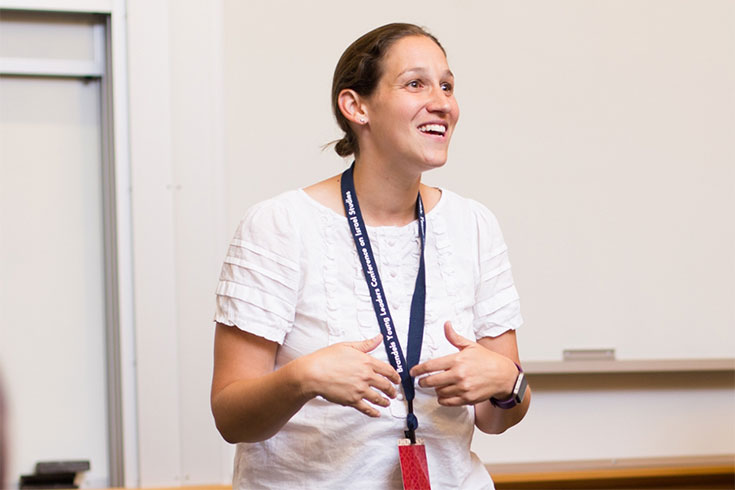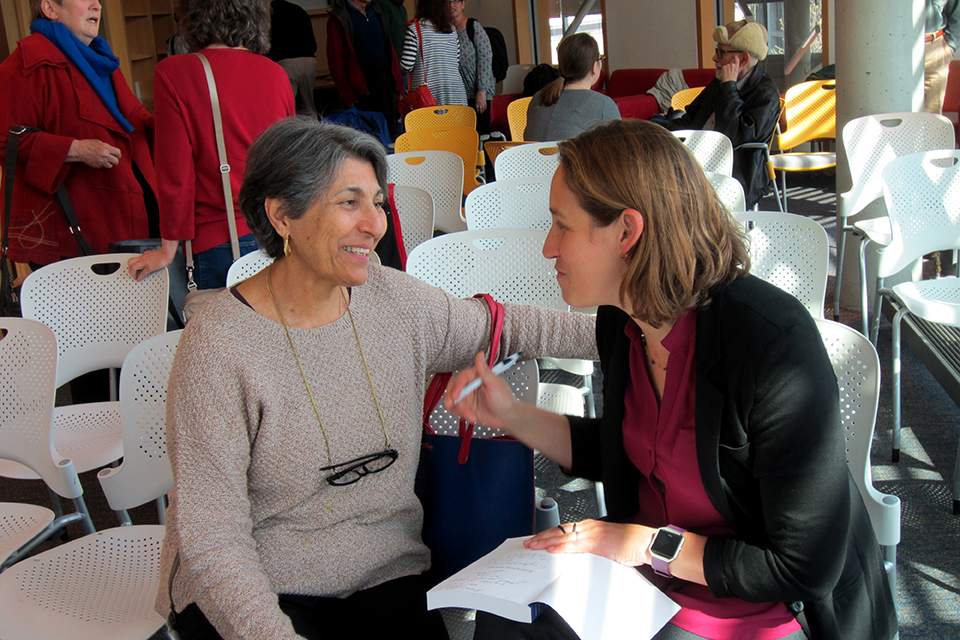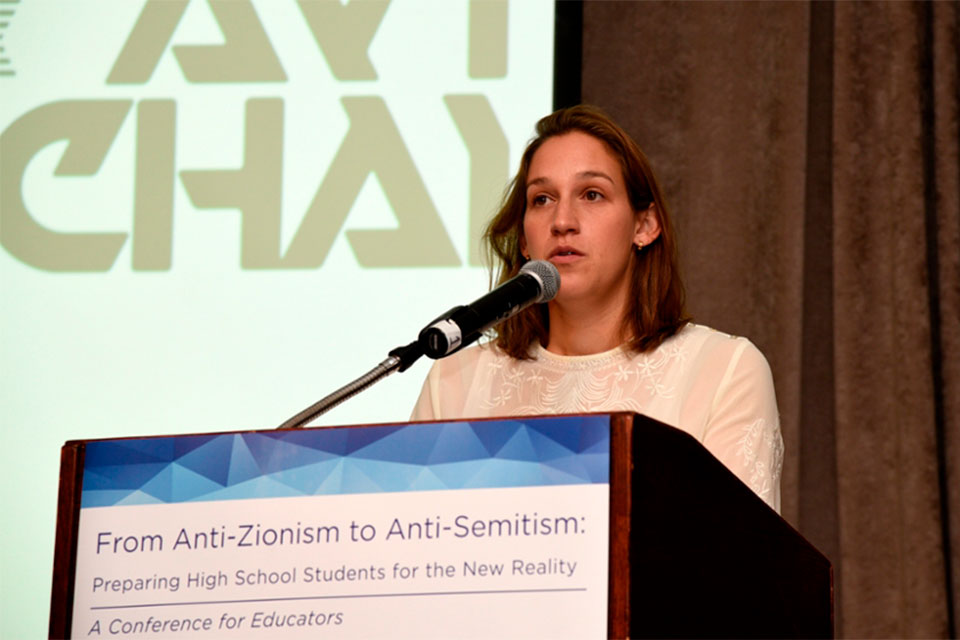Faculty Profile, Dr. Rachel Fish: Researching bi-nationalism, teaching Israel, and educating about pedagogy
November 3, 2017
 One state for two peoples – a state accepted and recognized by Israelis and Palestinians alike – could take many forms. Dr. Rachel Fish, PhD '13, associate director of the Schusterman Center for Israel Studies, researches how bi-nationalism has been imagined and articulated throughout Zionist and Israeli history. Over the past century, public intellectuals from Hans Kohn to Azmi Bishara and As’ad Ghanem have articulated radically different visions, often drawing on examples of other bi-nationalist states such as Belgium or Switzerland.
One state for two peoples – a state accepted and recognized by Israelis and Palestinians alike – could take many forms. Dr. Rachel Fish, PhD '13, associate director of the Schusterman Center for Israel Studies, researches how bi-nationalism has been imagined and articulated throughout Zionist and Israeli history. Over the past century, public intellectuals from Hans Kohn to Azmi Bishara and As’ad Ghanem have articulated radically different visions, often drawing on examples of other bi-nationalist states such as Belgium or Switzerland.
By unpacking the history of the bi-national idea in all of its incarnations in the Israeli-Palestinian context, Dr. Fish is able to differentiate among the variety of visions that have been articulated. In recent decades, an anti-Zionist vision of a bi-national state has been popularized. But Fish separates the concept of bi-nationalism from the context of advocacy and examines it through a scholarly lens. Her research sheds historical light on the advocates of a one-state solution and how the idea has transformed over time.
“In Israel, the idea of a one-state solution is talked about in public discourse, even though it has never been taken seriously in the political realm,” Fish tells us. “It is an idea that carries a lot of currency with many people and needs to be addressed. Now there are many who feel that, with the two populations being so intertwined, Israel is not capable of completely withdrawing from the West Bank. Many analysts are thinking about what it may mean if the two-state paradigm is no longer realistic.”
“Many analysts are thinking about what it may mean if the two-state paradigm is no longer realistic.”
Dr. Fish is currently in the processes of expanding her 2013 doctoral dissertation, "Configurations of Bi-nationalism: The Transformation of Bi-nationalism in Palestine/Israel 1920's-Present," into a book. This entails researching and writing two new chapters that will examine the political right’s religious objections to the two-state solution: the belief that the land is sacred to both Jews and Arabs and therefore should not be split up.
Fish is equally passionate about both research and teaching. Far from content with conversations within the academy alone, she cares deeply about education – going out into the world to facilitate learning.
“I would like my business card to read ‘scholar warrior’,” she explains. “I love teaching, and I see it as my oxygen in many ways.” And students recognize this. In 2015, when she held the Rohr Visiting Professorship at Harvard University, Fish was awarded the Derek Bok Certificate of Teaching Excellence. At Brandeis, Fish teaches the Myra Kraft Seminar in Israel as part of the Hornstein Jewish Professional Leadership Program, as well as History of the State of Israel in the Near Eastern and Judaic Studies department at Brandeis.
“I want my students to walk out of the classroom with question marks, not exclamation points.”
 Trained as a historian, Fish wants her students to wear the historian’s hat and learn to put a multitude of voices from the past into context. This is how students can come to appreciate the complexity of history. “I want my students to walk out of the classroom with question marks, not exclamation points.”
Trained as a historian, Fish wants her students to wear the historian’s hat and learn to put a multitude of voices from the past into context. This is how students can come to appreciate the complexity of history. “I want my students to walk out of the classroom with question marks, not exclamation points.”
Within Rachel Fish’s teaching model, the university classroom is an important laboratory for diverse ideas and analysis, as well as a space in which to encourage civil discourse. She emphasizes that “the university is in a unique position to model that kind of discourse—and one hopes that it will spill over into public discourse.”
In addition to her scholarship and teaching, Fish works to build the field of Israel Studies within the academy, and to expand opportunities for educators outside of it. With Ilan Troen, she co-edited the book Essential Israel with Ilan Troen, published earlier this year by Indiana University Press. A collection of academic essays designed to be readable for undergraduates and non-academic audiences, the book provides a solid foundation in a wide range of fields related to Israel – from history and geography to literature.

Fish also creates programming to share pedagogical methods and educational resources with other educators. She teaches in the Summer Institute for Israel Studies at Brandeis University and has replicated its model to reach wider circles of Jewish educators and Jewish communal practitioners through seminars taught by top scholars and based on thorough reading of academic sources. A 2016 conference organized by Fish, for instance, convened over 200 teachers and administrators from Jewish day schools from all across the United States and Canada to explore pedagogical methods for preparing high school students to navigate the college campus climate in relation to Israel. Students need to learn how to tell the difference between advocacy, polemics, and well-informed academic discussion. Fish also works with Brandeis University’s Office of Pre-College Programs on a highly successful Young Leaders’ Seminar on Israel Studies, introducing high school students to the value of the unbiased and academically rigorous study of Israel.
"Students need to learn how to tell the difference between advocacy, polemics, and well-informed academic discussion."
After her undergraduate degree in Middle Eastern Studies and Judaic Studies at George Washington University, Fish went on to complete a Master of Theological Studies degree in Contemporary Thought in Judaism and Islam at Harvard University (where she became a leader in campus protests regarding the source of funding for an Islamic Studies professorship). She began her doctoral studies in the department of Near Eastern & Judaic Studies at Brandeis University in 2005, becoming a Schusterman Scholar once the Schusterman Center was founded in 2007.
“When pursuing a PhD program, I wanted one in which Israel would be the nexus between Jewish Studies and Middle East Studies. In my previous studies, those two fields had been very ‘siloed.’ But Brandeis has a unique history with the study of Zionism and Israel in the Near Eastern & Judaic Studies department. What’s more, the larger ecosystem of this university allows deep integration of the study of modern Israel within the context of Jewish history as well as the history of the Middle East.” Fish adds that the Schusterman Center has unparalleled human capital in the field of Israel Studies. “It has been very exciting to be part of that as a young scholar.”
Did Rachel Fish always want to be a scholar? In answer to this question, she opens an old manila folder to reveal a home-made publication on Jewish topics that she created at age eleven. The cover is drawn endearingly in pencil on white printer paper. “Look at this,” she says, and points to where she listed her younger brother as a co-contributor and her father as editor. “I even put the copyright symbol – copyright 1990.”
